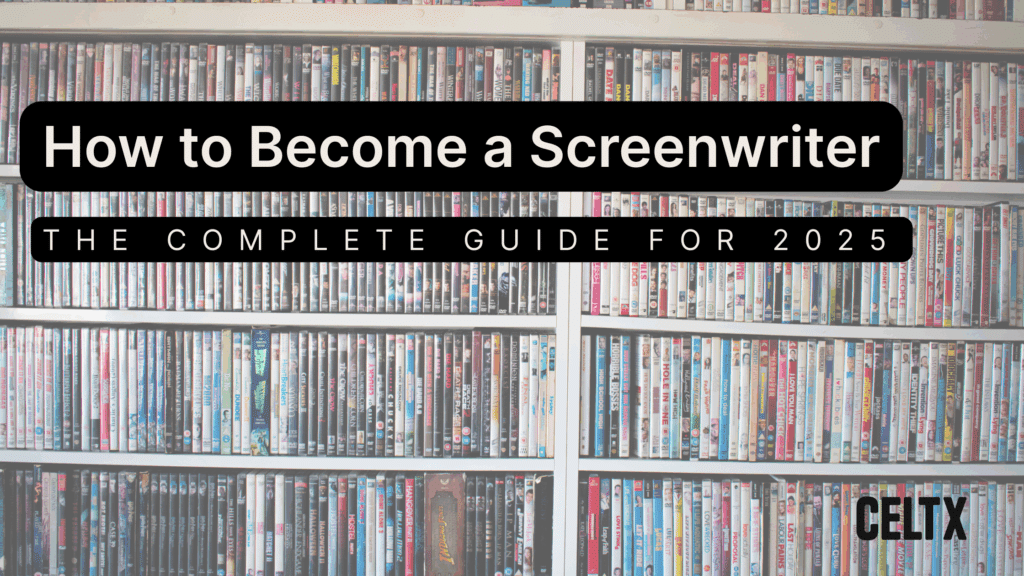
Joe Gilles, the struggling screenwriter protagonist of Sunset Boulevard once said that “Audiences don’t know somebody sits down and writes a picture; they think the actors make it up as they go along.”
That may be true (with the right level of skill), but getting to be the somebody writing the picture can be the trickiest step of the process. Everyone’s got a story to tell and the road to realizing your idea in 90-120 pages of script is not always easily walked.
That’s where we’ve got you covered. We’ll be taking you on a step-by-step guide to becoming a screenwriter, taking you all the way from the basics of craft, to pitching in front of executives. In 2025 and in an ever-changing film and television landscape, it’s essential we keep up to date with everything that’s going on and how to adapt as screenwriters.
Now, it’s worth mentioning that there is no “one way” to becoming a screenwriter. There are tried and tested method, but a little luck and being in the right place at the right time with your project can make all the difference. Remember, it’s important to be motivated and ready to tackle each obstacle one step at a time.
But first, let’s get to grips with the role of a screenwriter and its responsibilities.
In this Article
- What Does a Screenwriter Do?
- Do You Need Film School?
- Tools You’ll Need
- Ways to Break Into the Industry
- Screenwriting Tips for Beginners
- Staying Consistent and Revising
- What Next?
- FAQ
- Conclusion
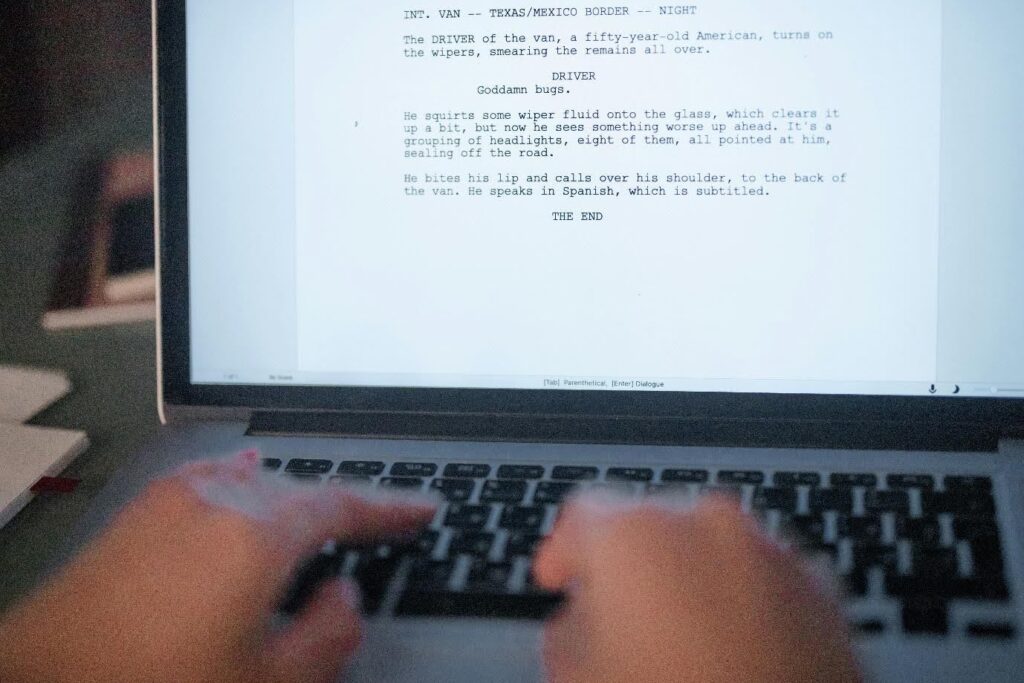
What Does a Screenwriter Do?
A screenwriter is the ultimate visual storyteller. They write scripts for movies, television shows, and even video games or branded content.
As screenwriters our responsibilities include:
- Develop compelling stories
- Write realistic, engaging dialogue
- Describe scenes, actions, and character behaviors
- Collaborate with producers, directors, and other creatives
- Revise and rewrite scripts based on feedback
Screenwriting is a very solitary role in production to begin with. But as soon as production kicks off, we’re required to be more collaborative.
In some cases, screenwriters will sell ‘spec scripts’ (original scripts written without a prior deal), get hired to write on assignment, or work in writers’ rooms for ongoing TV shows.
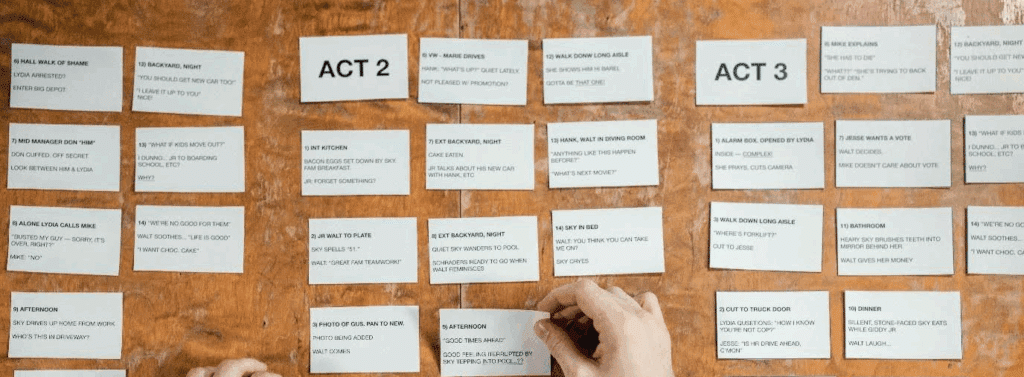
Do You Need Film School?
Let’s be real – no, you don’t need film school to become a screenwriter.
“Your background and life experience are equally important. To put a sharper point on it, the way you leverage your education and background to write a wholly unique script is how you use those qualifications to cut through all the noise in showbiz.” – Patrick Kopka (Interview with Southern New Hampshire University)
In 2025, many successful screenwriters have never set foot in a film school class. What’s most important is skill, perseverance, and a deep understanding of storytelling.
That doesn’t mean that film school can’t be a valuable experience. Attending can offer valuable networking opportunities, mentorship and structured feedback that can help you develop as a writer.
Let’s dive a little deeper into the pros and cons of film school.
Pros
- Direct contact with industry professionals
- Collaboration with peers
- Structured learning environment
- Firsthand experience with production, sometimes collaborating with students studying other film vocations
Cons
- High cost and student debt
- Not necessary to break into the industry
- Many free or cheaper online alternatives exist
Don’t worry if film school isn’t on the card for you. You can learn everything you need from books, online courses, screenwriting communities and just writing. A lot of writing!

For our run down on the best resources for honing your screenwriting craft away from the film school classroom, click here.
Tools You’ll Need
Every screenwriter has a toolbox, from a laptop to screenwriting software. Here are the essentials you’ll need to get started:
1. Screenwriting Software
We’ll say it until we’re blue in the face… you need screenwriting software! Too many writers rely on word processors and despite their best efforts, the formatting is never quite right.
The industry standard is there for a reason and screenwriting software guarantees you’ll hit the nail on the head every time.
So what screenwriting software is there to choose from?
Celtx
A popular option, our very own screenwriting software offers you professional-grade formatting and real-time collaboration with your team. We’re cloud-based, user-friendly, and great for both beginners and professionals.
Once you’ve finished writing, why not check out our storyboarding and scheduling tools to help launch your story from the page to the screen?
Plus, when you sign up, you receive one free project without having to spend a cent!
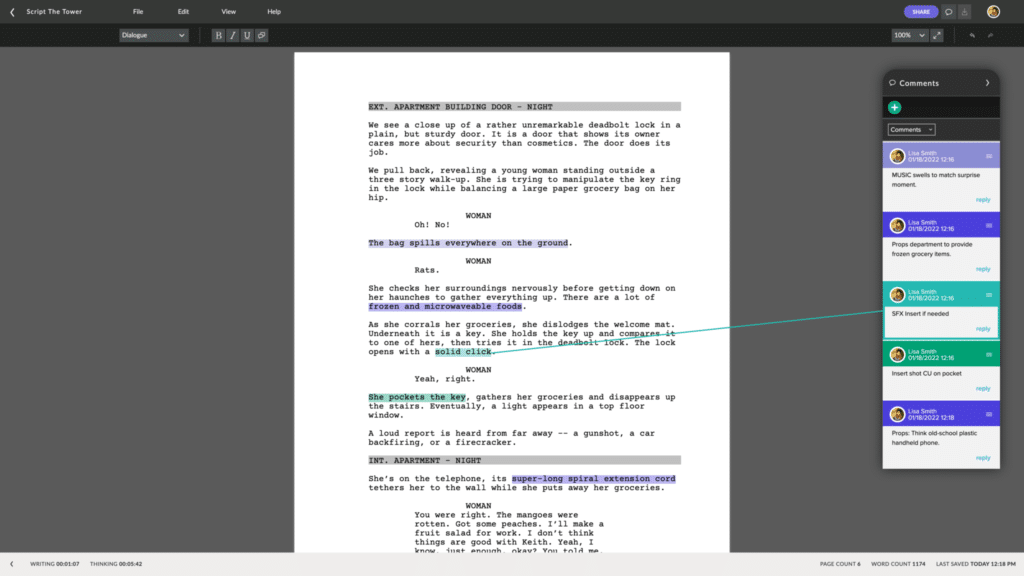
Final Draft
The industry standard Hollywood software, Final Draft is great for advanced formatting and revision tracking.
WriterDuet
Another cloud-based option, WriterDuet is great for real-time collaboration and version control.
FadeIn
A newer and more affordable contender with similar functionality to Final Draft.
Story Planning Tools
Planning is key! You can of course use your screenwriting software to help map out your story, however you can also use:
- Notecards (physical or digital like on Trello)
- Beat sheets (check out Save the Cat or the Hero’s Journey)
- Mind-mapping (on paper or on apps like Milanote)
Educational Resources
With advancements in technology and written materials, there are so many more resources available to screenwriters in 2025. Some are completely free, and others will need a small investment.
If you’re looking for reading materials, screenwriting books are a great option:
- Story: Substance, Structure, Style and the Principles of Screenwriting by Robert McKee
- Save the Cat by Blake Snyder
We have many more recommendations in our ultimate list of Best Screenwriting Books for Beginners.

Or, if you’d like to learn through visual content, you can either head over to YouTube for some fabulous free educational videos from channels like Lessons from the Screenplay or Film Courage.
For a more structured approach, platforms such as MasterClass offer courses from award-winning writers Aaron Sorkin and Shonda Rhimes. You will need to pay for these, but in our opinion, they’re well worth it!
Community Platforms
As we know, screenwriting is a solitary existence a lot of the time, so finding likeminded people who are on the same journey can be extremely rewarding. Here’s where community platforms come in.
Many are free to access such as Reddit’s r/Screenwriting where writers both new and experienced share ideas, ask for advice and discuss everything about the film industry.
Stage 32 is also a good option for finding courses, as well as acting as a gateway to agents and managers. You can also share loglines and ideas with your fellow writers.
Finally ScriptHop and the Black List are prestigious stepping stones with those who’s scripts are near ready for production!
Ways to Break Into the Industry
Have a kick-ass script portfolio that you’ve polished until it’s as shiny as you can possibly make it? Then it may be time to kick things up a notch.
The beauty of the film industry is that there is no one way to break in. Of course, there are proven strategies that many writers have used. However, the most exciting part is you can often find your own, unexpected paths.
The only thing we know for sure is that no screenwriter’s journey into the industry is the same.
So, how can you break in?
1. Screenwriting Contests
Competitions such as the Nicholl Fellowships, Austin Film Festival, and Final Draft’s Big Break are excellent ways to gain attention as a screenwriter.
If you can place highly or even win these contests, you may receive representation or meetings with top producers. They’re a great way to get noticed.
2. Fellowships and Labs
Programs like the Sundance Screenwriters Lab, Disney Writers Program, and NBC Writers on the Verge offer mentorship, industry connections, and sometimes even job placement.

3. Writing Spec Scripts
Spec scripts are just that: written on speculation to showcase a writer’s talent. Spec scripts are our calling cards, usually original TV pilots or feature films that highlight our writer’s voice, tone and storytelling chops.
4. Networking
If you’ve been reading Celtx blogs for a while (let’s face it, you should be!), you’ll know that networking is our favorite word!
Networking will always matter even if the world of advancing technology. Attend screenwriting events in person where you can, to connect with your fellow writers and meet producers and industry experts.
You can also meet others online through meetups and social media. LinkedIn is also a great resource to connect with other writers, directors and producers.
Posting loglines, scene samples, or process updates can also attract attention to you and your work online. Use relevant hashtags to engage with the right like-minded people!
5. Work in the Industry
Consider roles such as writers’ assistants, script readers, or development interns. Positions like these give you access, context and often relationships that can lead to your first writing gig.
Competition for these positions, like all within film and television is incredibly fierce, so find ways to stand out.

From your first scene to your final draft,
Celtx is built to support screenwriters at every stage.
Click here to sign up
Screenwriting Tips for Beginners
Before you break into the industry, there’s just one thing you need: a portfolio! To create a portfolio, you need screenplays!
All screenplays begin with an idea and a blinking cursor. Sometimes the hardest thing is to start writing. Well, we’re here to help. Here are five ways to get that keyboard tapping:
1. Start with a Logline
If you have an idea, start by condensing it into one sentence to keep your story focused.
The Matrix (1999) transports us to a complex and action-packed world, but its essence is captured in its logline:
A computer hacker is led by a stranger to a forbidding underworld, where he discovers the shocking truth – the life he knows is the elaborate deception of an evil cyber-intelligence.
Want to learn more about crafting a killer logline? Click here.
2. Outline Your Story
Use a beat sheet or act structure to plan major plot points. Remember that structure is your best friend, especially when you’re first starting out.
Don’t write blind!
3. Focus on Character
Great scripts have unforgettable characters. It’s crucial that you know your protagonist’s want vs. need, their flaws and how they’ll grow.
Find out more about Building Better Characters in our dedicated blog.
4. Show, Don’t Tell
Another key phrase in the film industry, but it does ring true! Remember that film is a visual medium. Instead of saying a character is nervous, describe it through action. For example:
Ben’s hands shake as he fumbles for the door key.

5. Write Badly First
As Ernest Hemingway once said, “The first draft of everything is shit”. Nothing could be truer.
If you take one thing from this blog today, it’s that your first draft will be rough. You will make mistakes, and that’s okay. The goal for the first draft is to get the story out so you can revise it.
Staying Consistent and Revising
Speaking of which… revisions are extremely important within the writing process. Writing a script is a marathon, not a sprint so you need to stay consistent as you move through each draft.
First, create your writing schedule and set aside time regularly to sit down and work on your script. This doesn’t have to be every single day but should be consistent. Try setting yourself a word count goal for each session. Even one page each time could give you a full draft in a short space of time.
Once you have your first draft, step away and come back with a plan and fresh set of eyes. We recommend three revision passes to begin with:
- Pass 1: Structure and pacing
- Pass 2: Dialogue and character
- Pass 3: Formatting, spelling and grammar
Also seek feedback from trusted readers, ideally other writers or people familiar with screenwriting conventions to help improve your work. Reputable script coverage services can also be helpful.
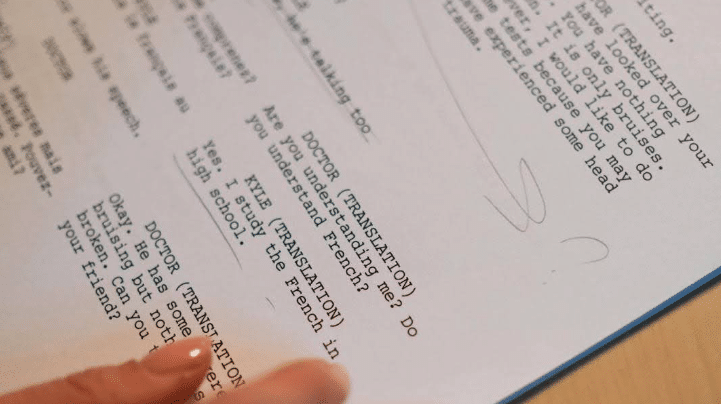
What Next?
When your script is ready, there are a few avenues you can go down.
If you’re looking to promote to industry experts, make sure you have a strong pitch ready alongside any supporting documents such as a treatment or series bible.
Or if you’d like to seek representation, send out query letters to agents or managers.
Many writers make their own script themselves. Feel free to produce a short film, collaborating with directors or film students. A short can showcase your style and build your portfolio at the same time!
Check out writer Roanne Bardsley’s story on how she became a screenwriter here.
FAQ
How long should a feature screenplay be?
Usually between 90 and 120 pages. One page roughly equals one minute of screen time.
Can I use AI to help me write screenplays?
AI tools can help with brainstorming or formatting, but compelling human stories come from you. Use it as a tool, not a replacement.
Should I copyright my script?
Register your script with the WGA or US Copyright Office to protect your work and prove authorship.
Am I too old to be a screenwriter?
There is no age limit to becoming a screenwriter. Many creatives succeed in their dreams later in life, and that means you can too!
Conclusion
Becoming a screenwriter in 2025 doesn’t require Hollywood connections or a film degree. It requires passion, discipline, and patience. The barriers to entry are lower than ever but the competition is fierce. The key is to focus on craft first, career second. Write consistently, revise relentlessly, and never stop learning.
Remember: every great screenwriter started with a blank page. Your job is to fill it with truth, conflict, character, and heart. So open Celtx and start writing!
Screenwriting in 2025 means thinking beyond the page.
Try Celtx for free and take your first step toward the screen.
Up Next:

Screenwriter vs. Scriptwriter | What’s the Difference?
Screenwriter vs. scriptwriter – these two titles are often used interchangeably in the film industry but are there meaningful differences between the two or is it all just a matter of semantics? This piece answers that question!
